30+ Sample Alcohol Use Policy
-
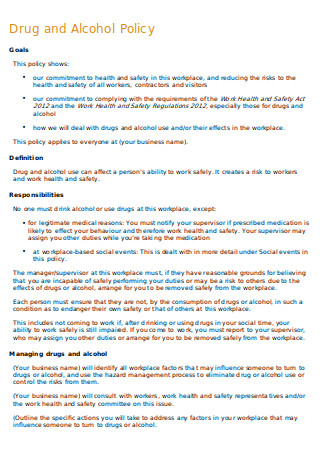
Drug and Alcohol Policy
download now -
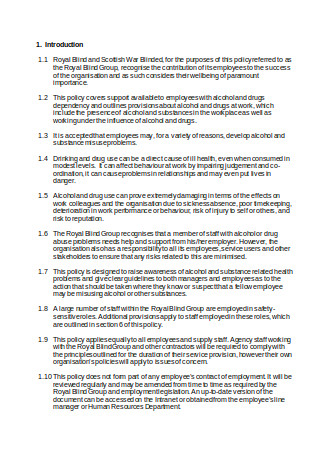
Alcohol and Drugs Policy
download now -
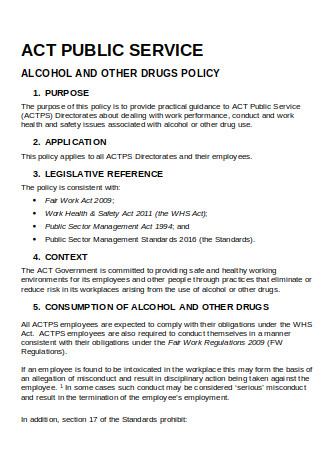
Alcohol and Other Drugs Policy
download now -
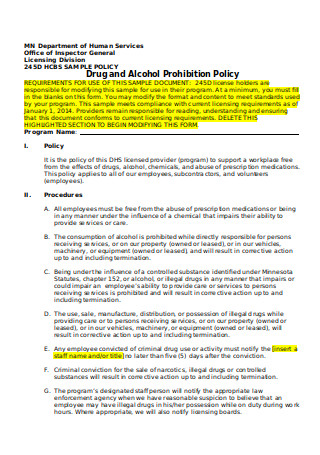
Drug and Alcohol Prohibition Policy
download now -
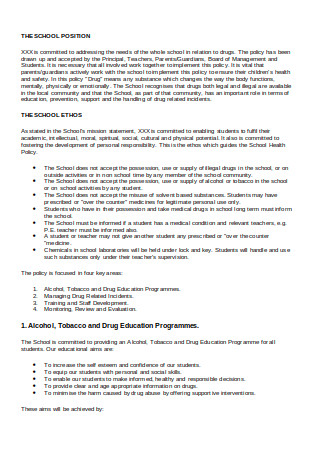
Substance Use Policy
download now -
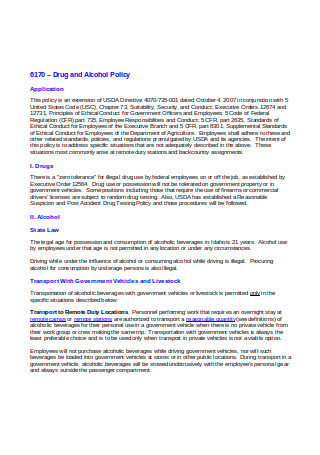
Sample Drug and Alcohol Policy
download now -
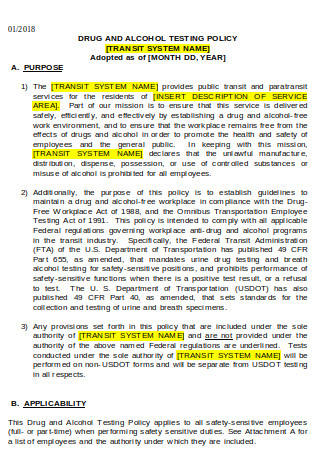
Drug and Alcohol Second Chance Policy
download now -
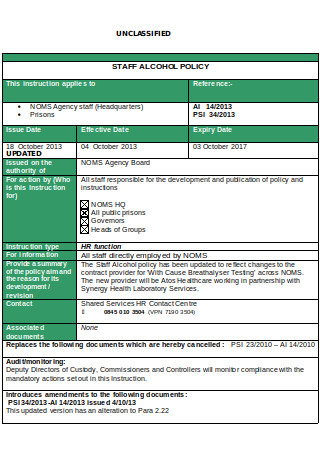
Staff Alcohol Policy
download now -
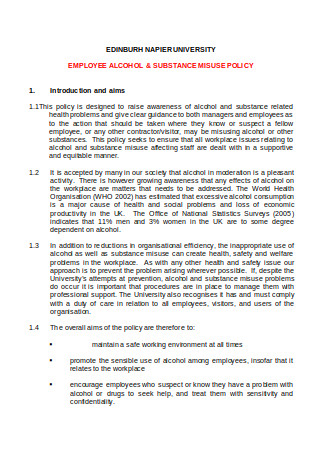
Alcohol and Substance Misuse Policy
download now -
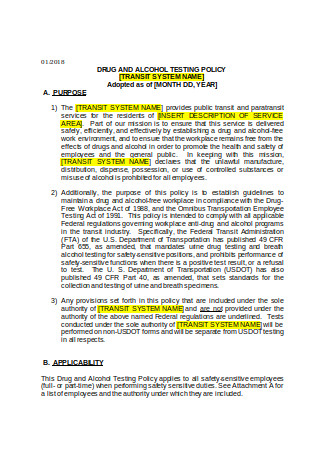
Drug and Alcohol Policy Zero Tolerance
download now -
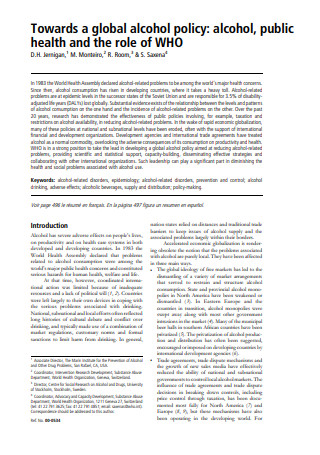
Global Alcohol Policy
download now -
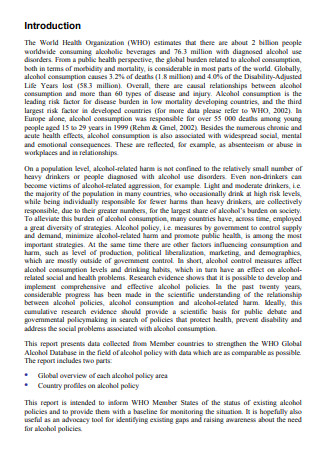
Alcohol Policy
download now -
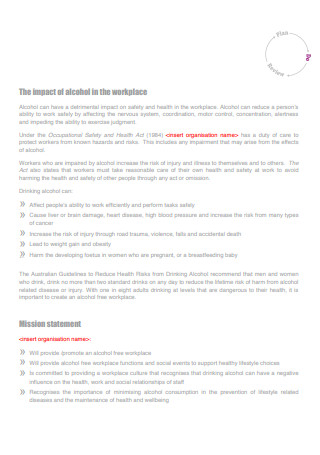
Alcohol Policy Template
download now -
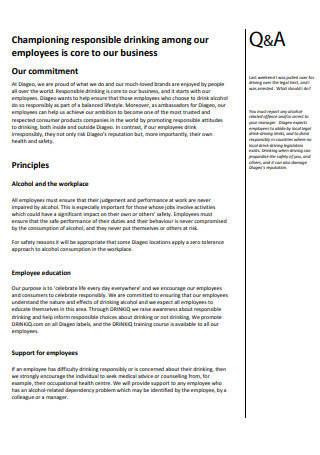
Employee Alcohol Policy
download now -
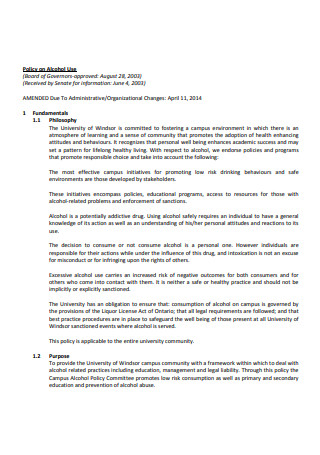
Policy on Alcohol Use
download now -
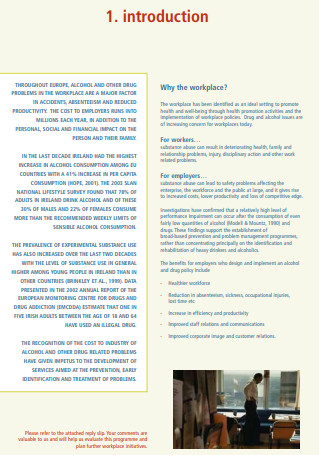
Alcohol and Drug Use Policy
download now -
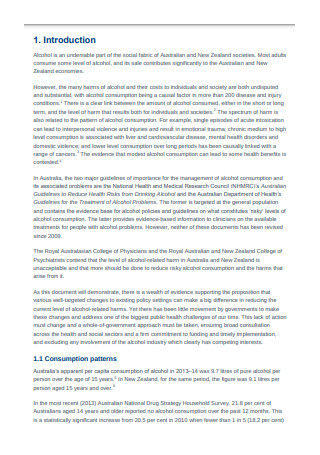
Sample Alcohol Policy
download now -
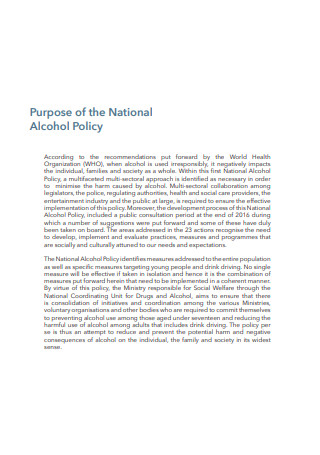
National Alcohol Policy
download now -
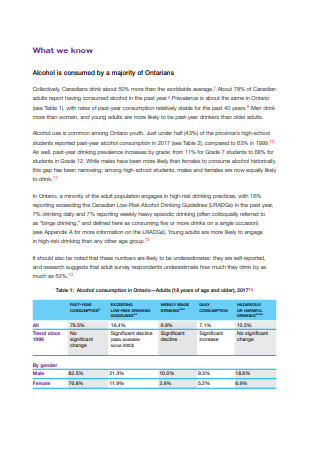
Alcohol Policy Framework
download now -
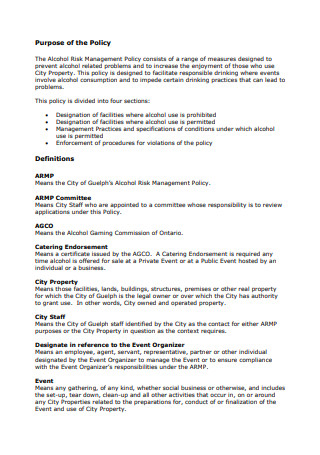
Alcohol Risk Management Policy
download now -
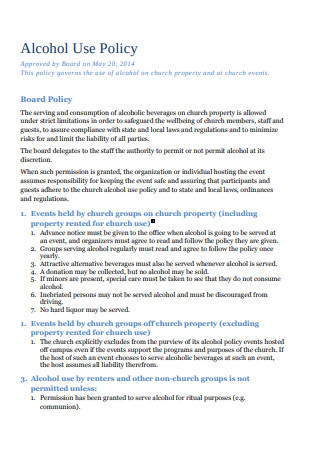
Alcohol Use Policy
download now -
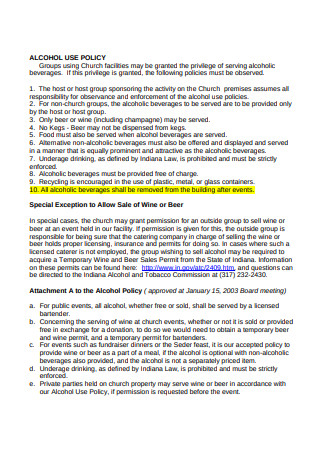
Sample Alcohol Use Policy
download now -
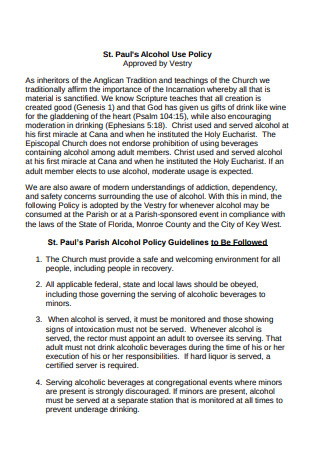
Church Alcohol Use Policy
download now -
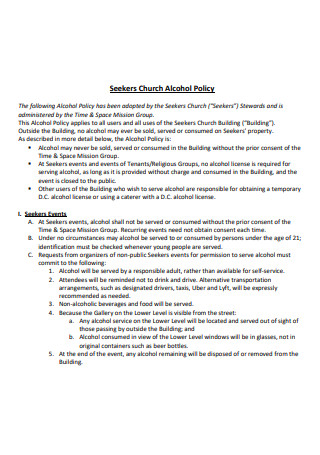
Seekers Church Alcohol Policy
download now -
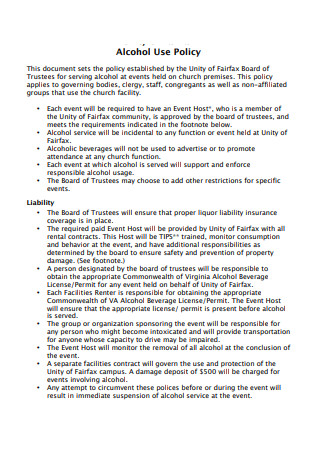
Alcohol Use Policy Sample
download now -
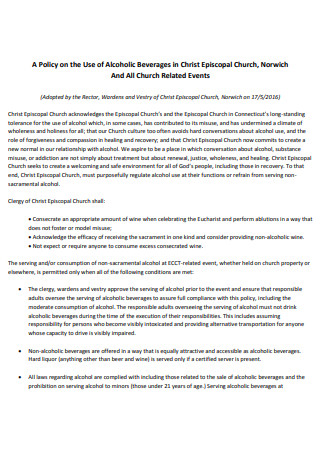
Policy on Use of Alcoholic Beverages
download now -
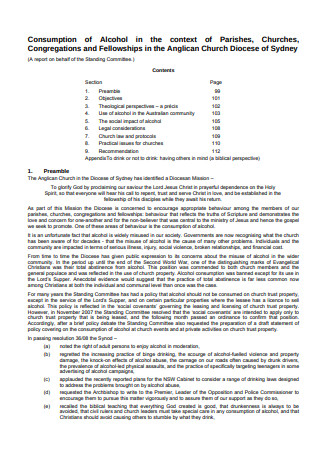
Policy on Consumption of Alcohol
download now -
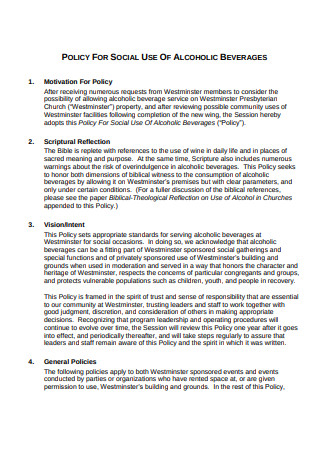
Policy on Social Use of Alcoholic Beverages
download now -
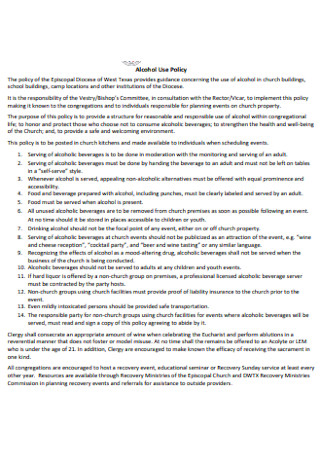
Basic Alcohol Use Policy
download now -
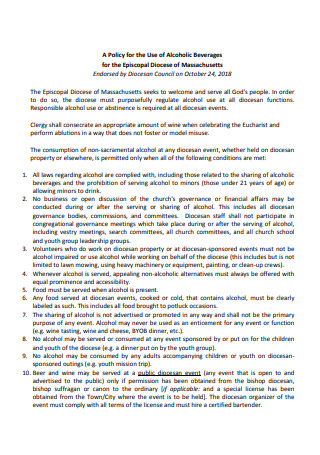
Diocesan Alcohol Use Policy
download now -
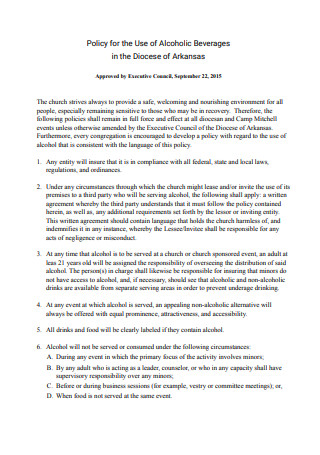
Policy for Use of Alcoholic Beverages
download now
FREE Alcohol Use Policy s to Download
30+ Sample Alcohol Use Policy
What Is an Alcohol Use Policy?
Main Purpose of Crafting an Outstanding Alcohol Use Policy
Entities Who Can Benefit From Proper Alcohol Use Policy Implementation
9 Steps for Creating an Effective Alcohol Use Policy
Advantages of Developing a Detailed Alcohol Use Policy
Dos and Don’ts for Making the Best Alcohol Use Policy
What Is an Alcohol Use Policy?
An alcohol use policy focuses on ensuring the appropriate use and allowable consumption of alcoholic drinks within the operational hours of the business. It scopes and limits both the availability and usage of alcohol for/by employees who are still immersed in work processes or are still in their working hours. Do you know that 11% of fatalities in the workplace are related to alcohol use (source: alcopro)? Having an alcohol use policy allows organizations to take alcohol use-related concerns and issues seriously so that possible problems which rooted out from the matter at hand can be lessened or even be eliminated.
Main Purpose of Crafting an Outstanding Alcohol Use Policy
You have to make sure that you are guided by a set of objectives and goals once you decide to make a company policy about alcohol use. It is imperative for you to know what the policy is for and how it can beneficial to the organization in the long run. Knowing the reasons why you came up to the decision of drafting an alcohol use policy can enable you to narrow down your discussion and content presentation to the most necessary. Here are some of the objectives that are essential to be realized with the help of the outstanding alcohol use policy which you have crafted for your organization:
1. To Educate Employees About Proper and Acceptable Alcohol Use
There are companies that allow their employees to drink within the facility of the business as a form of incentive. If you decide to do the same, your alcohol use policy can serve as a reference that your employees can look into so that they can be mindful of their alcohol consumption during office hours. Ensuring that your employees are properly educated about the matter can help you inculcate the importance of following rules and regulations related to the use of alcohol in the workplace. With this, make sure that you will indicate the amount of alcohol that can be consumed by your employees within a given duration. You can also educate your employees about the appropriate times when they can drink alcoholic beverages and the designated place or location where they can enjoy drinking either by themselves or with the other employees of the business.
2. To Regulate or Limit the Consumption of Alcohol Within the Organization
As a business that allows its workforce to drink during working hours, it is your responsibility to limit your employees’ consumption of alcohol as you also need to consider their health, work performance, and overall well-being. Developing an alcohol use policy can enable you to remind your employees that drinking alcohol while at work is done to relax them and not to get them drunk. Through the usage of an alcohol use policy, you can present the tracking strategies and methodologies that you will rely on to limit the kinds and number of drinks that your employees can have.
3. To Present the Consequences That Employees Who Will Violate Alcohol Use-Related Rules and Regulations May Face
Your alcohol use policy can strengthen your stand about the appropriate consumption of alcohol when done in the workplace. Your policy document can provide a clear and straightforward idea about the consequences and/or disciplinary actions that your employees may face if they will violate any of the specifications of the alcohol use policy.
Entities Who Can Benefit From Proper Alcohol Use Policy Implementation
An alcohol use policy can impact your stakeholders differently. Even if there are ways on how they can experience the same advantages of having an alcohol use policy, there are still specific benefits that only them can experience. Are you aware on how your alcohol use policy can impact the performance and activities or processes of particular stakeholders? Some of the entities who can benefit from the proper implementation of an alcohol use policy are as follows:
9 Steps for Creating an Effective Alcohol Use Policy
Your company needs to standardize its responses whenever given problems arise in the workplace due to alcohol consumption. Doing this can be easier if you will have an effective alcohol use policy at hand. Here are nine steps that can give you an easy time when making a strategic alcohol use policy:
Step 1: Download an Editable Alcohol Use Policy Template
We suggest you to use an alcohol use policy template so you can format the layout or structure of your alcohol use policy with ease. Modify the pre-formatted header, title, and other content details of your chosen template so you can make the document truly your organization’s own.
Step 2: Create an Informative and Clear Alcohol Use Policy Introduction
Come up with a brief introduction that can showcase the design and framework of your alcohol use policy. Make the purpose, goals, mission, and objectives of the alcohol use policy as clear as possible. Allowing your stakeholders to be well-informed can lessen future inquiries and possible misunderstandings.
Step 3: Identify the Extent of Alcohol Use in Your Organization’s Workplace
One of the most important areas of your alcohol use policy is the scope and limitations of alcohol consumption within the workplace. Provide a location or a number of locations where your employees can drink. Make sure that they are also aware of the types of alcoholic drinks that they can consume. Limit the number of alcohol that they can take as well as the time frame in which they can do so. This can ensure your stakeholders that you are very particular with the alcohol use in your organization even it is a part of your incentives for your employees.
Step 4: Provide a List of Rules and Regulations About Alcohol Use
Do not forget to write down all of the rules and regulations that you will implemented with regards alcohol use. Make this discussion very detailed so you can cover all the areas of concern and issues that you would like to resolve.
Step 5: Present Call-to-Actions That Need to Be Implemented If a Suspected Alcohol Abuse Has Been Proven to Be Real
Be particular with the processes of investigation that will take place whenever violation of the alcohol use policy has been observed. Give an idea about the enforcement of your procedures so that your employees can be aware of what they may be subjected to if they will overlook or dishonor any of the policy’s specifications.
Step 6: Give an Idea About the Programs That You Can Offer to Your Employees In Relation to the Subject Matter
If there are alcohol misuse or abuse reports, give an idea about the programs that you have prepared for your employees. The content of this segment will depend on the range of activities that you have in mind for those members of the workforce who were proven to violate your policy.
Step 7: Come Up With an Effective Policy Conclusion
End the alcohol use policy by having a strong wrap-up about your specified rules and regulations. It will be best if you can also give an idea about the evaluation of the policy’s efficiency and the ways on how your organization can ensure the proper management of the alcohol use policy’s objective implementation.
Step 8: Use an Annex to Present Additional and Supporting Information
If there are additional details that you would like to include in the policy, you can use an annex. Here, you can present the state and federal laws that are aligned with the content specifications of your organization’s alcohol use policy. Utilize this segment of the alcohol use policy by adding as much relevant and informative information or attachments as possible.
Step 9: Finalize or Refine Your Alcohol Use Policy Draft
Make sure to look into the policy’s draft before sending it to involved entities. Look for mistakes or errors that you can remove or edit while you still can. Continuously conduct a policy analysis so you can update the content of your alcohol use policy when and if necessary.
Advantages of Developing a Detailed Alcohol Use Policy
Your alcohol use policy should be crafted excellently, effectively, and efficiently so that you can maximize its usage. Having a credible and well-developed alcohol use policy can enable you to execute your plans of action and implement your strategic alcohol use regulations with ease. There are a variety of circumstances and instances where a detailed alcohol use policy can be deemed beneficial for your organization. To make you more familiar with this matter, here are the advantages of developing a detailed alcohol use policy:
Dos and Don’ts for Making the Best Alcohol Use Policy
Developing an alcohol use policy that can be advantageous to your organization and its stakeholders can be a tedious job. If you want to have a faster and easier time when making an alcohol use policy, there are several guidelines that can be very useful on your part. Below are some of the tips that can help you make the best alcohol use policy for your company, establishment or organization.
Do’s
1. Do Consider the Root of the Concern
When making an alcohol use policy for your organization, you have to first acknowledge the negative effects of drinking in relation to your work requirements and operational needs. Your employees need to know why they are given certain limitations when it comes to drinking before going to the workplace or even during office hours. You need to provide them with a concrete view of the concern’s root cause so they can further understand why the development and implementation of an alcohol use policy is deemed necessary.
2. Do Communicate With an Attorney and/or an ‘Alcohol Use Policy’ Expert
It is suggested for you to get professional and legal advice as you try to come up with an alcohol use policy for your business. Talking to an attorney or any other expert in dealing with the subject at hand can help you see a bigger picture of the alcohol use policy’s benefits and risks. Being guided by an expert’s sound advice can also help you know your obligations to your employees as you try to implement the said policy.
3. Do Look Into the Values and Culture of Your Organization
Before you create an alcohol use policy, you first have to observe the drinking culture within your workplace. Do you let your employees drink alcoholic beverages during work hours if a project has been successful? Do you have a happy hour in your organization where serving alcoholic drinks is one of the perks of your employees? The more you dig in to your culture relating to alcohol consumption as an organization, the easier it will be for you to identify the areas where policy specifications about the matter is needed. You have to ensure that your alcohol use policy can form a strong foundation that is highly-aligned with the alcohol culture within your business or company.
Don’ts
1. Don’t Feel That the Development of the Alcohol Use Policy is the Responsibility of the Management Alone
It is important for you to involve your employees with the creation of your alcohol use policy. There is a reason why some employers tend to let their employees sign a document specifying that the employees are responsible for their own behavior whenever they are in the influence of alcohol during work hours. Allowing your workforce to be a part of the creation process of your organization’s alcohol use policy, may it be through interviews; group discussions; or letting them answer employee questionnaires, can enable you to have understanding of relevant and related issues which you may not be able to further look into if you will make the specific policy on your own.
2. Don’t Make Your Alcohol Use Policy Confusing, Incomplete, and/or Irrelevant
Your alcohol use policy content should be specific, concrete, precise, and direct to the point. Do not confuse your employees by developing alcohol use policy segments that are open for interpretations. Make sure that you are relaying the exact message that you would like to tell to your employees so you can veer away from possible misunderstandings due to misleading, incomplete, and/or irrelevant alcohol use policy information specification.
3. Don’t Copy the Alcohol Use Policy of Other Businesses
Tailor the alcohol use policy to your organization. Look into your existing alcohol use regulations, programs, insurance coverage, and other variables which you think can affect the content and actual execution of your alcohol use policy. Just because an alcohol use policy worked for other organizations does not mean that it will also work for you. Have an original alcohol use policy that is suitable with your nature of operations, alcohol-related incentives and regulations, and work culture.
Prepare for the development of an exemplary alcohol use policy. Download any of the templates and samples listed above so you can have credible and reliable references as you try to make your organization’s own alcohol use policy.
